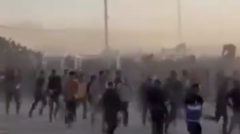The trial of Dmitriy Kurashov, a Russian soldier accused of executing a Ukrainian veteran, marks a significant moment in the ongoing conflict in Ukraine. As Kurashov becomes the first Russian soldier to face trial for such a crime, his case exemplifies the broader issues of war crimes, accountability, and the search for justice amidst ongoing warfare.
Historic War Crimes Trial: A Russian Soldier's Stand for Justice in Ukraine

Historic War Crimes Trial: A Russian Soldier's Stand for Justice in Ukraine
Dmitriy Kurashov faces prosecution in a landmark trial as the first Russian soldier in Ukraine to be charged with executing a prisoner of war, reflecting the ongoing complexity of war crimes accountability.
In a watershed moment during the ongoing war in Ukraine, Dmitriy Kurashov has emerged as the first Russian soldier to stand trial for the execution of a prisoner of war. The courtroom drama unfolds in Zaporizhzhia, just over a year after the tragic incident in which Ukrainian soldier Vitalii Hodniuk, known by the callsign ‘Penguin’, was shot while attempting to surrender. This unprecedented trial, bringing vital issues of war crimes to the forefront, showcases both the complexities of legal accountability during conflict and the deeply intertwined narratives of personal stories.
On the front lines amid a bitter winter, Ukrainian forces continue to fight back against Russian advances, with stark reminders of the human cost of war. Kurashov’s trial centers around allegations that he shot Hodniuk execution-style after calling for the Ukrainian soldier to come out of a foxhole. The charge represents a violation of international law concerning the treatment of prisoners of war.
Despite his initial plea of not guilty, Kurashov switched to a guilty plea during the trial, claiming his change of heart was motivated by a desire to expedite proceedings. However, he continues to maintain his innocence informally, insisting another soldier, a medic, was responsible for the shooting. This dual narrative highlights ongoing debates surrounding guilt, command responsibility, and the chaotic circumstances of frontline warfare.
Ukrainian authorities allege that battlefield executions by Russian forces have surged, with at least 124 documented cases since the full-scale invasion began, further complicating the legal landscape in which Kurashov finds himself. The matter escalates when considering the significant challenges posed by the lack of forensic evidence and the reliance on witness testimony from fellow soldiers, who are themselves prisoners of war with possible motives to testify against their former comrade.
The SBU, Ukraine’s security service, has been meticulous in its investigations, collecting over 2,000 pages of evidence, amidst claims of systemic commands from Russian superiors that encouraged the execution of surrendered enemies. Witnesses in Kurashov’s trial, comprising former members of the same unit, have testified against him, claiming they witnessed the murder as ordered.
This trial not only tests the Ukrainian legal system's capability to prosecute war crimes effectively, given the absence of specialized courts, but it also raises profound ethical questions about how to administer justice for crimes committed in the context of war. Prosecutor Mykyta Manevskyi, managing his first war crimes case, reflects on the unique difficulties of gathering evidence from a battlefield and navigating the multi-layered implications of holding individuals accountable while still being embroiled in an active conflict.
Meanwhile, Kurashov's background now casts a shadow over him—rising from his childhood in an orphanage, he became entangled in a web of crime and imprisonment before being conscripted into the war effort. His circumstance, which pushed him into a conflict he barely understood, emphasizes the tragic nature of War, where the lines between victim and perpetrator blur.
As legal proceedings unfold, questions on accountability persist. If Kurashov is convicted, he could face life in Ukrainian prison, shifting from the context of prisoner of war to civilian criminal. In contrast, if he were to be exchanged for prisoners held by Russia, the broader implications of such exchanges weigh heavily on the quest for justice and the complexities of reconciliation in a war-torn landscape.
In this intricate interplay of identity, morality, and law, Kurashov's trial encapsulates not just a pivotal moment for those within its confines, but also offers a broader narrative on the horrors of war and the hopes for justice that arise even from its darkest chapters.

















